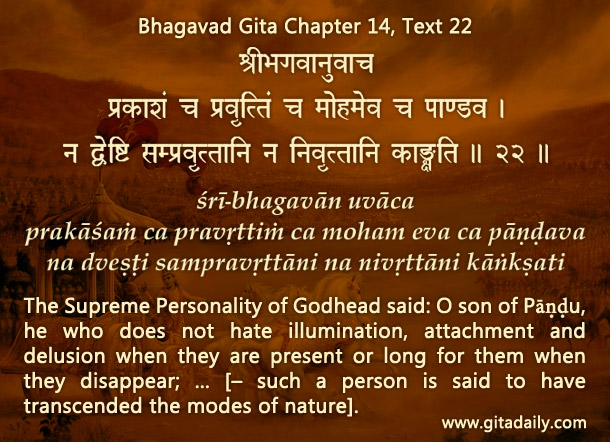Our emotions are an essential part of who we are; without them, we would be reduced to a flavorless, robotic existence. Though they add value to our life, they can also steal value — especially when they impel us toward instant pleasure or relief at the cost of long-term growth.
How can we manage our emotions so that they work for us, not against us? By learning to identify them, not identify with them.
Helping us to do this, Gita wisdom provides us a clear understanding of the various levels in our inner world. Two levels relevant to our discussion are the spiritual and the mental. At our core, we are souls; and we are surrounded by a subtle body that can be referred to in shorthand as the mind. Most of our emotions arise from our mind – and we as souls are meant to be observers and evaluators of those emotions, as recommended in the Bhagavad-gita (14.22).
Unfortunately, because emotions arise from inside us, we reflexively tend to think of them as our emotions. Having thus identified with them, we start believing that acting according to them is essential for our well-being, even for our very existence.
Thankfully, we have a better alternative: we can identify our emotions. Instead of saying to ourselves, “I am feeling angry”, we can say, “That emotion arising inside me is anger.” Just the endeavor to identify an emotion can activate our intelligence. Further, the act of identifying an emotion can create a cognitive distance between it and us. Thus, we can more easily remind ourselves that we are souls different from our minds. Being thus self-situated, we can evaluate our emotions on merit and respond to them appropriately.
One-sentence summary:
To manage your emotions more effectively, don’t identify with your emotions; identify your emotions
Think it over:
- How can emotions both add value to our life and subtract value from it?
- Why do we tend to identify with our emotions?
- How can identifying our emotions help us manage them more constructively?
***
14.22: He who does not hate illumination, attachment and delusion when they are present or long for them when they disappear; … – such a person is said to have transcended the modes of nature.
To know more about this verse, please click on the image


Leave A Comment